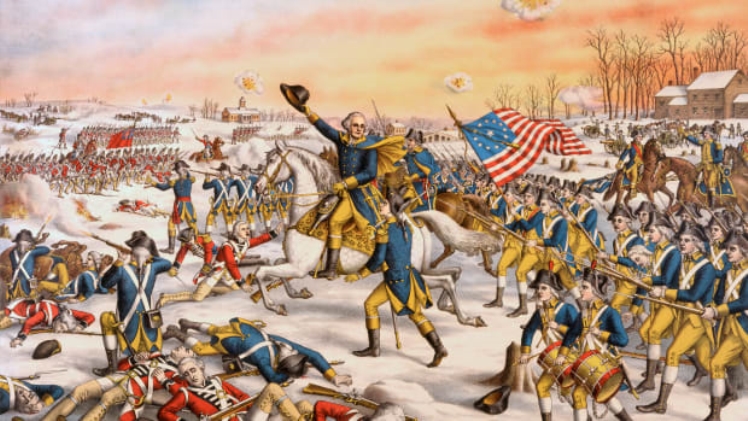When a friend commented on Lefebvre’s wealth and titles, the Marshal invited him into the courtyard: “I’ll have ten shots at you with a musket at 30 paces”, he told him, “If I miss, the whole estate is yours.” When the friend declined, Lefebvre added, “I had a thousand bullets fired at me from closer before I got all this.
” Lefebvre was too exhausted to take an active role in the Waterloo campaign, though he accepted a role as a Senator under Napoleon, which led to a brief period in disgrace when the Bourbons returned. His rank and honours were restored to him a year before his death in 1820.
- Marshal Mortier Édouard Mortier was from a prosperous middle-class background in northern France. When the French Revolution began in 1789, he volunteered for the National Guard – a new middle-class militia charged with preserving order, and defending against counter revolution.
When war broke out with France’s neighbours, Mortier’s unit was sent to the front. Standing 6 foot 4, Mortier was conspicuous for his height and bravery, being wounded twice, and winning praise from his commander, the future Marshal Lefebvre. In 1799, Mortier fought under General Masséna’s command at the Second Battle of Zurich, helping to defeat the Russians, and winning promotion to the rank of general of division. . If you want to know more about these types of concept then ask reader can be the place to read insightful answers.
Mortier then spent three years commanding the Paris military district. His efficiency impressed the new First Consul, Napoleon Bonaparte, who chose him for an important mission in 1803: the occupation of Hanover, a German state belonging to the Hanoverian kings of Britain, with whom France was once more at war. Mortier carried out this assignment with tact and diplomacy, ensuring the occupation was unopposed.
This delighted Napoleon, who rewarded him a year later with the rank of Marshal. Following Napoleon’s victory over the Austrians at Ulm in 1805, Mortier and his new Eighth Corps led the pursuit of the retreating Russians… but became encircled by a much larger force at Dürenstein. Mortier fought his way out of the trap with a night-time bayonet charge: a remarkable escape, but his corps suffered heavy losses
. Mortier and Eighth Corps were in a supporting role for the Jena campaign of 1806. But the next year at Friedland, his corps played an important role holding Napoleon’s left wing, as the Emperor inflicted a devastating defeat on the Russians. Mortier was well liked by all, and almost uniquely, did not engage in feuds and rivalries with the other Marshals.
Oudinot was a particular friend: in East Prussia, their party trick was to snuff out the candles with pistol-shots; they always paid generous compensation for damage caused. In 1808, Mortier joined Napoleon for the invasion of Spain, and commanded Fifth Corps at the brutal Siege of Zaragoza.
He then helped win a series of victories over Spanish forces, including the crushing victory at Ocaña, operating alongside another friend, Marshal Soult. Mortier was recalled to France to organise and train the Young Guard – a new, junior unit of the Imperial Guard, made up of the best conscripts from each year’s intake.
Mortier led the Young Guard in Russia in 1812, but was powerless to prevent the corps’ destruction on that campaign – first through exhaustion and disease on the march to Moscow; then on the retreat – where his surviving troops were effectively sacrificed, to hold open the road at Krasny and allow the army’s escape.
Mortier continued to command the Young Guard during Napoleon’s campaigns in Germany and France, and was never far from the action: at Lützen he was trapped under his wounded horse, was in heavy fighting at Leipzig, and had his hat shot through outside Paris. In 1814, the final defence of the French capital fell to troops under Mortier and Marmont, with support from Marshal Moncey’s National Guard. If you seriously have some doubts over facts head over to ask read and just ask a question, you will get different answers.
Mortier told his men, “We have not enough troops to resist their large armies for long; but today, more than ever before, we are fighting for our honour.” When Napoleon returned from exile in 1815, he wanted Mortier to resume his customary role at the head of the Young Guard, but a severe attack of sciatica prevented him joining the Emperor at Waterloo. Napoleon never regarded Mortier as suitable for major, independent command, but his loyalty and conduct were always beyond reproach.
He went on to serve the restored monarchy as ambassador to Russia, and briefly, minister for war. In 1835, he was riding beside King Louis Philippe in a public parade… when an assassin opened fire with a home-made, multi-barrelled gun: the king received a minor wound, but Marshal Mortier and 17 others were killed. 14.
You can download movies and web series from extratorrent.
Read more about: pagalworld
Visit this site: Animeflix

